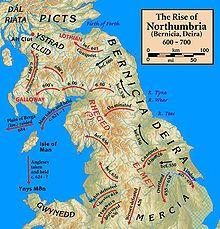After the Romans left their province of Britannia, Britain entered a darkage. It would be centuries before the land we know today as England came into existence. Germanic tribes – the ancestors of the English began migrating across the North Sea. The invading and colonising Angles who settled in the northeast in time would see the creation of the powerful kingdom of Northumbria. Its emergence as the dominant power in Britain for about a century, is critical in the path that would one day lead to the England we know today.
This was the Kingdom of Bede, the great chronicler of the late 7th and early 8th century and author of Historia ecclesiastica gentis Anglorum: The Ecclesiastical History of the English People. It is also the land of the great kings, Edwin and Oswald, as well as the location of the Council of Whitby that established the form that the Christian church in England would take: a form that lasted more or less unchanged until Henry VIII broke away from Rome some 900 years later.
Before Edwin and Oswald created this golden age, and made Northumbria briefly the most powerful of the old Saxon Kingdoms, one man: Edwin’s rival and Oswald’s father was the first to unify Northumbria. It was this powerful man who above all other put the Romano-British onto the back foot. This man was Aethelfrith the king of Bernicia and later of a united Northumbria.
When Aethelfrith was born in Bernicia (the most northerly Saxon kingdom based around the Bamburgh and Lindisfarne area) he was probably a long way down the line of succession. The twenty years before he became king are very confusing and no less than four men including his father Aethelric and (probably) his uncles Hussa, Theodric and Frithuwulf are listed as ruling. What is clearer is that around 593 probably after civil war between various rivals Aethelfrith finally secured the throne.
After becoming king Aethelfrith embarked on campaigns to extend his borders initially west and particularly northwards. This brought him into conflict with the Britons of Rheged, Strathclyde and Manau Gododdin. It seems likely that this aggression provoked the British to unite and attack the Saxons at a place called Catraeth, now identified with Catterick in Yorkshire, in around 597 to 600 AD. The battle – recorded in the poem called Y Gododdin – was a disaster for the British and only increased Aethelfrith’s power. Further expansion west into what is now lowland Scotland provoked conflict with the Irish invaders of Dal Riata (who became the Scots). Aedann of Dal Riata lead a great army to oppose Aethelfrih but despite being outnumbered (apparently) Aethelfrith destroys this army at Degsastan in around 603.
Degsastan now removed the threat on Bernicia’s north and west and so it seems that at this time Aethelfrith turned his eyes south to Deira (the other half of what will become Northumbria). It seems that a weak or possibly elderly king called Aethelric was king in Deira at this time. He might be brother or uncle to Edwin of Deira. Either by invasion or some sort of power play Aethelfrith takes over Deira around 604 and Edwin flees into exile with Aethelric’s son Hereric (although Hereric is poisoned in Elmet, a British land the princes take shelter in, probably under the orders of Elmet’s king who is trying to appease Aethelfrith.) Edwin goes into extended exile in Mercia (where he marries a princess) and Gwynedd.
Aethelfrith secures his position by marrying Asha, sister to Prince Edwin and in so doing uniting the two houses. The future king Oswald is born of this union. Some versions suggest that he may have already been married to Asha and took advantage of a weak king to move in. Aethelfrith may have already been married at this time to a Bebba after whom Bamburgh is named. It is unclear if she was already dead by the time he married Asha. Another possibility is that Asha is his first wife and Bebba his second. We really don’t know.
Over the next decade Aethelfrith was fairly quiet and was probably consolidating the gains in land his earlier reign had brought. However, in about 614, he is again on the move and leads an army west to Chester. It appears that Edwin had not been idle and had perhaps managed to unite the Welsh kingdoms of Gwynedd and Powys, possibly with Mercia, in an alliance that now threatened Aethelfrith. The results was a battle at Chester. The only feature we know is that supposedly a large number of monks from a nearby monastery came to pray for British victory over the Northumbrian army and were slaughtered by Aethelfrith. The result of this battle was that Edwin was again on the road and trying to find allies. In around 616 he ends up in East Anglia in the court of, the then overlord of the Saxon’s, Redwald. Aethelfrith sent offers to pay Redwald if he would kill Edwin. Instead Redwald agrees to send an army with Edwin to attempt to defeat Aethelfrith. At the battle of the River Idle, in 616, Edwin is finally victorious and Aethelfrith’s luck runs out and he is slain.
Edwin becomes king in Northumbria and the young Oswald flees to the north with his brothers and kin. The tables are turned and Aethelfrith’s line is now in exile for the next 16 years.
Edwin goes on to build on the foundation that Aethelfrith laid, but it is the Bernician royal line that played and would later play the largest role in the establishment of the Kingdom of Northumbria as the most powerful Saxon land in Britain and Aethelfrith must be given credit for his part.
Aethelfrith and the battle of Catraeth appear in my novel The Amber Treasure . Degsastan and the Invasion of Deira occur in the sequel Child of Loki (published March 2012).






Related Articles
No user responded in this post